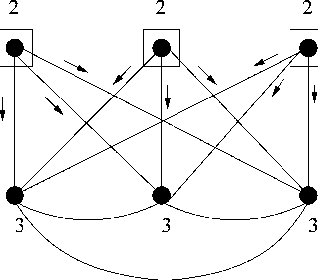Message-passing for Maximum Weight Independent Set
Paper and Code
Jul 31, 2008


We investigate the use of message-passing algorithms for the problem of finding the max-weight independent set (MWIS) in a graph. First, we study the performance of the classical loopy max-product belief propagation. We show that each fixed point estimate of max-product can be mapped in a natural way to an extreme point of the LP polytope associated with the MWIS problem. However, this extreme point may not be the one that maximizes the value of node weights; the particular extreme point at final convergence depends on the initialization of max-product. We then show that if max-product is started from the natural initialization of uninformative messages, it always solves the correct LP -- if it converges. This result is obtained via a direct analysis of the iterative algorithm, and cannot be obtained by looking only at fixed points. The tightness of the LP relaxation is thus necessary for max-product optimality, but it is not sufficient. Motivated by this observation, we show that a simple modification of max-product becomes gradient descent on (a convexified version of) the dual of the LP, and converges to the dual optimum. We also develop a message-passing algorithm that recovers the primal MWIS solution from the output of the descent algorithm. We show that the MWIS estimate obtained using these two algorithms in conjunction is correct when the graph is bipartite and the MWIS is unique. Finally, we show that any problem of MAP estimation for probability distributions over finite domains can be reduced to an MWIS problem. We believe this reduction will yield new insights and algorithms for MAP estimation.
 Add to Chrome
Add to Chrome Add to Firefox
Add to Firefox Add to Edge
Add to Edge